Related Research Articles

Political identity came to the territory now occupied by the Principality of Liechtenstein in 814, with the formation of the subcountry of Lower Rhætia. Liechtenstein's borders have remained unchanged since 1434, when the Rhine established the border between the Holy Roman Empire and the Swiss cantons.

Hans Brunhart is a politician and journalist from Liechtenstein who served as the Prime Minister of Liechtenstein from 1978 to 1993.

Alexander Frick was a political figure from Liechtenstein who served as Prime Minister of Liechtenstein from 1945 to 1962.
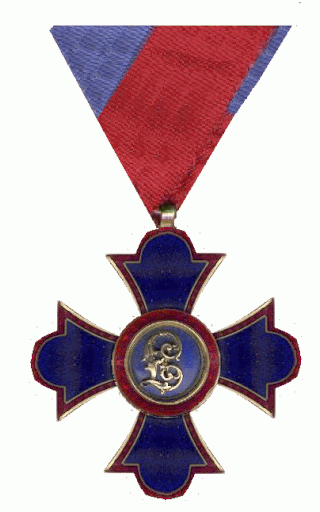
The Order of Merit of the Principality of Liechtenstein is an order of merit of the Principality of Liechtenstein that is awarded for services rendered to the principality. Franz I, Prince of Liechtenstein founded the Order of Merit of the Principality of Liechtenstein on 22 July 1937.

Alfred J. Hilbe was a politican from Liechtenstein who served as Prime Minister of Liechtenstein from 1970 to 1974.
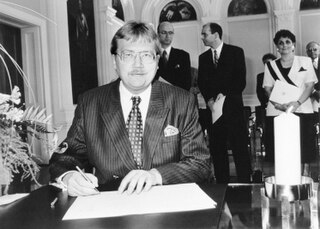
Markus Büchel was a lawyer and politician from Liechtenstein who served as the Prime Minister of Liechtenstein in 1993. Serving for just under 7 months, he is the shortest serving prime minister in Liechtenstein's history.

Gustav Schädler was a teacher and politician from Liechtenstein who served as Prime Minister of Liechtenstein from 1922 to 1928.

General elections were held in Liechtenstein on 4 April 1939. Although a new system of proportional representation had been introduced to pacify voters at a time when the country was under threat from neighbouring Nazi Germany, it was not used and the elections became known as the "silent elections" as no actual vote was held. Instead, the governing Progressive Citizens' Party and opposition Patriotic Union formed a coalition, assigning a roughly equal number of seats each, in order to prevent the German National Movement in Liechtenstein from acquiring any seats in the Landtag.
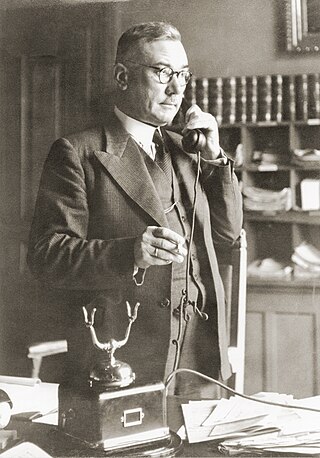
Franz Josef Hoop was a Liechtensteiner diplomat and politician who served as Prime Minister of Liechtenstein from 1928 to 1945. Hoop is best known for his efforts to retain Liechtenstein's neutrality and independence during World War II. Serving for seventeen years, he is the longest-serving prime minister in the country's history, ahead of his successor Alexander Frick by 79 days. He served under the reign of Johann II, Franz I and Franz Joseph II, making him the only prime minister to serve under three Princes of Liechtenstein consecutively.

Alois Vogt was an advocate and political figure from Liechtenstein who served as the Deputy Prime Minister of Liechtenstein from 1938 to 1945.
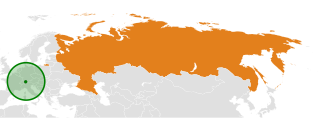
Foreign relations between Russia and it's predecessors with Liechtenstein date back to the Napoleonic wars. Both countries established diplomatic relations on 30 January 1994. Since then, relations between the two countries have been distant, with Liechtenstein condemning the Russian invasion of Ukraine.
Josef Büchel was a teacher and civil servant from Liechtenstein who served as the Deputy Prime Minister of Liechtenstein from 1957 to 1965.

The GustavSchädler cabinet was the governing body of Liechtenstein from 10 June 1922 to 15 June 1928. It was appointed by Johann II and was chaired by Gustav Schädler.

The second Alexander Frick cabinet was the governing body of Liechtenstein from 8 March 1951 to 31 December 1957. It was appointed by Franz Joseph II and chaired by Alexander Frick.

The 1992 Liechtenstein constitutional crisis was culminated on 28 October 1992 when Hans-Adam II called for a referendum regarding Liechtenstein's accession to the European Economic Area to be held before the corresponding referendum in Switzerland, against the countries custom union and the wishes of the government and the Landtag of Liechtenstein.

The Fourth Hans Brunhart cabinet was the governing body of Liechtenstein from 5 June 1989 to 26 March 1993. It was appointed by Hans-Adam II and was chaired by Hans Brunhart.

The Markus Büchel Brunhart cabinet was the governing body of Liechtenstein from 26 March to 15 December 1993. It was appointed by Hans-Adam II and was chaired by Markus Büchel.

The First Mario Frick cabinet was the governing body of Liechtenstein from 15 December 1993 to 9 April 1997. It was appointed by Hans-Adam II and was chaired by Mario Frick.

The First Mario Frick cabinet was the governing body of Liechtenstein from 9 April 1997 to 5 April 2001. It was appointed by Hans-Adam II and was chaired by Mario Frick.
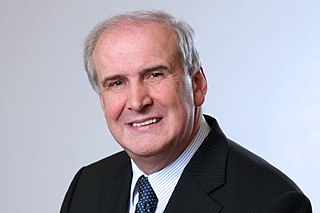
The First Otmar Hasler cabinet was the governing body of Liechtenstein from 5 April 2001 to 21 April 2005. It was appointed by Hans-Adam II and was chaired by Otmar Hasler.
References
- 1 2 3 4 5 6 "Frick, Mario". Historisches Lexikon des Fürstentums Liechtenstein (in German). 31 December 2023. Retrieved 26 November 2023.
- ↑ "Altregierungschef Markus Büchel gestorben". Liechtensteiner Vaterland (in German). 9 July 2013.
- ↑ "Mitglieder der Regierung des Fürstentums Liechtenstein 1862–2021". www.regierung.li.
- ↑ Dataset: Liechtenstein: Parliamentary Election 1993 - October European Election Database
- ↑ Dataset: Liechtenstein: Referendum on the European Economic Area membership 1995 European Election Database
- ↑ "AGREEMENT ON THE EUROPEAN ECONOMIC AREA". European Free Trade Association . 19 August 2016. Archived (PDF) from the original on 27 March 2019. Retrieved 7 May 2017.
- ↑ Marxer, Wilfried (31 December 2011). "Patriotic Union (VU)". Historisches Lexikon des Fürstentums Liechtenstein (in German). Retrieved 14 May 2023.
- ↑ "Referendum Results". IFES Election Guide. Retrieved 2011-02-19.
- ↑ "Team". www.sfplex.li. Retrieved 2023-09-26.
- ↑ "Liechtenstein bank chief shot dead". BBC News . 7 April 2014. Archived from the original on 28 October 2021. Retrieved 12 August 2024.
- ↑ "Police identify body of banker killing suspect". The Local. 18 August 2014. Archived from the original on 2014-08-19.
- "Liechtenstein", Encyclopædia Britannica from Encyclopædia Britannica 2006 Ultimate Reference Suite DVD. Accessed October 11, 2008.